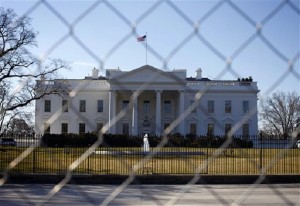Obama, Republicans cooperate on spending _ for now

The White House as seen through a chain-link fence where the inaugural reviewing stand once stood in Washington. The Obama administration and congressional Republicans are quietly working in tandem to blunt the impact of $85 billion in spending cuts that kicked in a few days ago—especially for the military. AP/Pablo Martinez Monsivais
WASHINGTON—The Obama administration and congressional Republicans are quietly working in tandem to blunt the impact of $85 billion in spending cuts that kicked in a few days ago—especially for the military.
The economic recovery-threatening cuts through the end of the budget year on Sept. 30 are split between the Defense Department and domestic programs. But legislation drafted by Republicans in the House of Representatives to prevent a government shutdown on March 27 gives the Pentagon and the Veterans Affairs Department flexibility to allocate cuts that no agency currently has.
A vote on the measure was arranged for Wednesday.
Senate Democrats seem likely to agree to the flexibility if it can be expanded to include other agencies, according to several officials who described closed-door talks that involved the White House. Among the candidates are the departments of Homeland Security, Transportation, Justice and State. The officials spoke on condition of anonymity, saying they were not authorized to disclose details.
The move marks a reversal for President Barack Obama, who spoke dismissively in recent days of Republican plans for flexibility in administering the cuts.
Article continues after this advertisement“The problem is when you’re cutting $85 billion in seven months, which represents over a 10 percent cut in the defense budget in seven months, there’s no smart way to do that,” the president said Feb. 26.
Article continues after this advertisement“You don’t want to have to choose between, Let’s see, do I close funding for the disabled kid or the poor kid? Do I close this Navy shipyard or some other one?”
The cuts were designed to be blunt and unattractive that the Obama administration and a bitterly divided Congress would be forced to come up with an alternative for trimming the country’s deficit. They didn’t, which now leaves agencies with the challenge of chopping the same rough percentage of their budgets, no matter their priority or efficiency.
Agency heads lined up for weeks to warn about the possible consequences. The military was the most vocal.
Pentagon officials embraced the idea of budget flexibility even before the measure came to a vote in the House.
The difference for the Navy is “almost night and day,” the service’s top uniformed officer told Congress on Tuesday. With flexibility, said Adm. Jonathan Greenert, the chief of naval operations, work could proceed on the overhaul of two aircraft carriers and construction on a third, all projects that the Pentagon had said would be curtailed without any changes.
The Pentagon did not immediately say whether it also would be able to order the USS Harry S. Truman to the Persian Gulf region, a mission it announced earlier would fall victim to the cuts.—With David Espo, Donna Cassata and Andrew Taylor